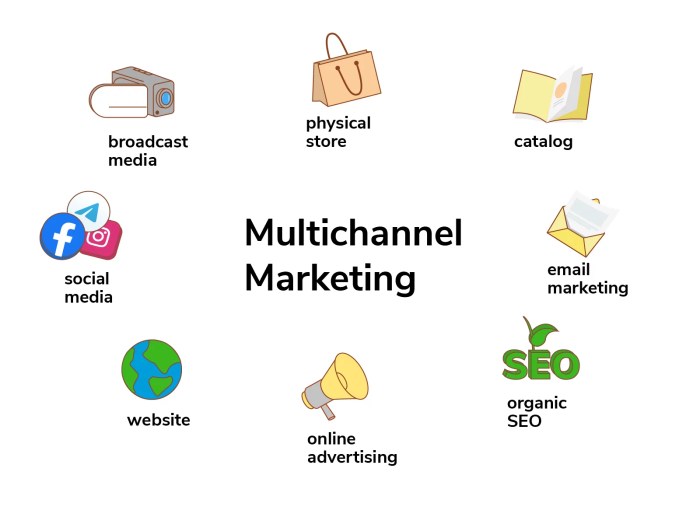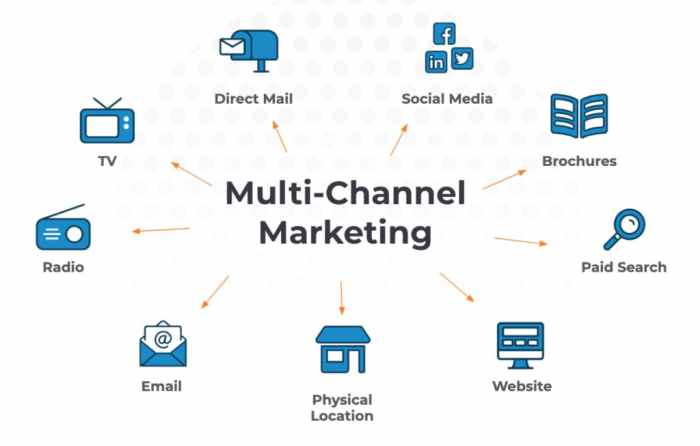Multi-Channel Marketing is a game-changer in the business world, revolutionizing how companies connect with their audience through various platforms. From boosting brand visibility to enhancing customer engagement, this strategy is a must for any modern business looking to thrive in a competitive market.
As we delve deeper into the realm of Multi-Channel Marketing, we uncover the key components that make it a vital tool for businesses of all sizes.
Definition of Multi-Channel Marketing

In the world of business, multi-channel marketing refers to the use of various marketing channels to reach customers and promote products or services. This approach involves utilizing a combination of online and offline channels to connect with consumers on different platforms and touchpoints.
Examples of Different Channels Used in Multi-Channel Marketing
- Social media platforms such as Facebook, Instagram, and Twitter
- Email marketing campaigns
- Physical stores or brick-and-mortar locations
- Online marketplaces like Amazon or eBay
- Mobile apps for seamless shopping experiences
The Importance of Integrating Various Channels for a Cohesive Marketing Approach
Integrating multiple channels in a marketing strategy helps to create a unified brand experience for customers. By reaching consumers through different touchpoints, businesses can increase brand visibility, engage with their audience more effectively, and drive conversions. A cohesive multi-channel approach also allows for consistent messaging and branding across all platforms, enhancing brand recognition and loyalty.
Benefits of Multi-Channel Marketing

In today’s digital age, utilizing multiple channels in marketing campaigns can offer a plethora of advantages for businesses looking to expand their reach and engage with customers on various platforms.
Improved Brand Visibility
By implementing multi-channel marketing strategies, businesses can significantly enhance their brand visibility across different channels. Whether it’s through social media, email marketing, or traditional advertising, having a presence in multiple places increases the likelihood of reaching potential customers and staying top of mind.
Reaching a Wider Audience
One of the key benefits of multi-channel marketing is the ability to reach a broader audience than traditional single-channel approaches. By diversifying marketing efforts across various platforms, businesses can connect with different demographics and target markets, ultimately expanding their customer base.
Increased Customer Engagement, Multi-Channel Marketing
Multi-channel marketing allows businesses to interact with customers in more meaningful ways, leading to increased engagement and brand loyalty. Whether it’s through personalized emails, social media interactions, or targeted advertisements, utilizing multiple channels enables businesses to connect with customers on a deeper level, fostering long-term relationships.
Strategies for Effective Multi-Channel Marketing
When it comes to multi-channel marketing, having a solid strategy in place is crucial for success. By seamlessly integrating online and offline channels, maintaining consistent messaging, and tracking performance, businesses can maximize their reach and engagement with customers. Let’s dive into some key strategies to ensure effective multi-channel marketing.
Design a plan for integrating online and offline channels seamlessly
Integrating online and offline channels is essential for creating a cohesive brand experience for customers. To achieve this, businesses should:
- Ensure consistent branding and messaging across all channels.
- Utilize technologies like CRM systems to track customer interactions across channels.
- Create a unified customer journey that seamlessly transitions between online and offline touchpoints.
Discuss the importance of consistent messaging across all channels
Consistency is key when it comes to multi-channel marketing. To maintain a cohesive brand image and message, businesses should:
- Develop a brand style guide to ensure uniformity in tone, voice, and visuals.
- Train employees across all channels to deliver a consistent brand experience.
- Regularly review and update messaging to align with current brand values and customer expectations.
Provide tips on how to track and analyze the performance of each channel for optimization
Tracking and analyzing the performance of each channel is vital for optimizing marketing efforts. To effectively measure performance, businesses can:
- Utilize analytics tools to monitor key performance indicators (KPIs) for each channel.
- Implement A/B testing to compare different strategies and determine the most effective approach.
- Collect feedback from customers through surveys and reviews to gauge satisfaction and identify areas for improvement.
Challenges in Multi-Channel Marketing
Implementing multi-channel marketing strategies can come with its fair share of challenges that businesses need to overcome to ensure success. From channel attribution to data integration, navigating these obstacles requires careful planning and strategic execution.
Channel Attribution
Channel attribution is one of the key challenges faced in multi-channel marketing. Determining which channels are driving conversions and attributing the right value to each touchpoint can be complex. To overcome this challenge, businesses can utilize multi-touch attribution models that assign credit to various touchpoints along the customer journey. By analyzing data from different channels and touchpoints, businesses can gain insights into the effectiveness of each channel and optimize their marketing efforts accordingly.
Data Integration
Another common hurdle in multi-channel marketing is data integration. With data scattered across various channels and platforms, businesses may struggle to consolidate and analyze data effectively. To address this challenge, businesses can invest in marketing automation platforms that centralize data from different channels, providing a holistic view of customer interactions. By integrating data from disparate sources, businesses can create personalized and seamless experiences for customers across all channels.
Successful Approaches
Several businesses have successfully overcome challenges in multi-channel marketing by adopting innovative approaches. For example, companies like Starbucks have implemented a unified customer experience across online and offline channels by leveraging customer data to personalize interactions. By investing in technology and analytics, businesses can streamline data integration and attribution processes, ultimately enhancing the overall effectiveness of their multi-channel marketing strategies.
